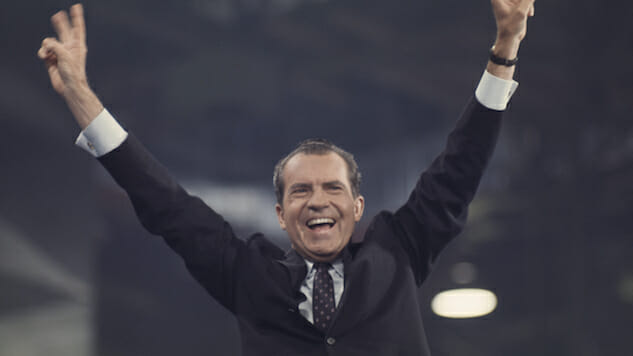With Tricky Dick, CNN Raises the Question: What Constitutes “Fair” Coverage of a Man Like Richard Nixon?
Photo: Getty Images (via CNN)
Are we better off with everything on TV? Every damned detail being made available to a worldwide jury in a massive, never-ending, court-of-public-opinion show trial? And what is the point of politics? No, really: Do people think being in charge or in some semblance of control is a kind of be-all, end-all thing? What is “power?” What does that word really connote? I get why “optics” is a thing, why politicians manipulate situations and perceptions to influence decision-making—to sell the public on the need to escalate the war, for example. I get the superficial reasons why people cultivate things like wars—personal profit, continuing power or influence. Where it falls apart for me is why this remains important after you have more personal profit than you could lose in a lifetime, or what “power” in the abstract really gives anyone. I’m not trying to be a shit-disturber or wantonly disingenuous. This stuff isn’t rhetorical, and I don’t have an answer.
Richard Nixon was a lot of things. Scathingly ambitious, unscrupulous, guilty of fraud. Petulant. Paranoid. Snarky. Manipulative. He was bitter and sometimes nasty. He was awkward and funny-looking. He was intelligent and exceedingly competitive. He was known to believe that black people couldn’t handle military leadership positions and that gay people were “trying to destroy” society. He nagged Henry Kissinger about being annoyingly over-concerned with civilian death tolls in Vietnam. And yes, he did call the press “the enemy.” Except the press was more of a “frenemy,” to be honest. He loved the spotlight, the attention of the press, the ability to use it to persuade people he was right, and he loved that at least as much as he hated it. In CNN’s new archival-recording collage Tricky Dick, he’s also… prescient? What is the equivalent of déjà vu when you’re looking at actual documents from the past and realizing everything just happens over and over? That.
As time rolls on, we have more and more archival stuff and more ability to compose documentaries in this interesting, and at its best, eloquent, style—no hosts, no pondering scholars, no centering voiceovers by warm-throated, elocution-forward actors: a 100% archival clip format, composed like a mixed media collage. The rise of television as a political tool ensured all kinds of information we didn’t have in the 19th or early 20th centuries was given the opportunity to become “iconic” or “seminal” or otherwise underpin the American zeitgeist. Tricky Dick reminds us that its notorious subject-object also actively used recording technologies until they became the instrument of his own demise. In four one-hour segments, we see Nixon go from scrappy newcomer to vice president to bitter wash-up (after his failed presidential bid and subsequent failed gubernatorial run in California), then back to the White House and finally out of it, in the aftermath of the Watergate scandal. The program’s linear, well-produced, easy to follow, and it does teach you a fair amount about who Nixon was, who he wasn’t, and what was happening in the United States and around the world that formed the tributaries of his presidency—the Vietnam War, the civil rights movement, the assassinations of Martin Luther King, Jr. and Robert F. Kennedy. But perhaps the biggest reason to tune in is for a weird little reality check about what’s happening in Washington right now. Because Tricky Dick will illuminate a lot of parallels between the United States of the 1960s and 1970s and what we are dealing with today. And it will also prompt some questions about what we include in our histories and why.
-

-

-

-

-

-

-

-

-

-

-

-

-

-

-

-

-

-

-

-

-

-

-

-

-

-

-

-

-

-

-

-

-

-

-

-

-

-

-

-








































